Excerpts from the acceptance speeches of the Book Award winners, Honor Book recipients and the Keats Centennial Lecture
Don Tate, New Writer
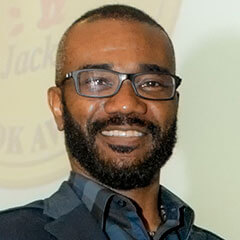 …Poet has been a wonderful journey. The most meaningful part of that journey came last September, when I launched the book in North Carolina. It was a wonderful week. I spoke at libraries and bookstores, elementary schools and the University of North Carolina at Chapel Hill. I conducted radio and newspaper interviews.
…Poet has been a wonderful journey. The most meaningful part of that journey came last September, when I launched the book in North Carolina. It was a wonderful week. I spoke at libraries and bookstores, elementary schools and the University of North Carolina at Chapel Hill. I conducted radio and newspaper interviews.
…During my presentation at Horton Middle School, I noticed a guy sitting in the back. He sat there with a smile that seemed to brighten the dark room. Afterwards, he came up and introduced himself as a descendant of George Moses Horton. He was so excited—even inviting me to dinner at his home.
Throughout that week, he brought his family out to each of my events. I met a whole contingent of proud George Moses Horton relatives. But the best part was being able to put a book into the hands of a young girl, maybe 8 years old, a young descendant of George Moses Horton. When we talk about mirrors in children’s books—the importance of a child seeing themselves—it really doesn’t get any better than that.
During one of my presentations, a Horton descendant approached me and thanked me for writing the book and getting Horton’s story right. And then she said something that made my heart stop. She said, “There’s just one little thing.” She asked that when I speak about George, I read a particular poem, a favorite. I decided that from that point on, I would read an excerpt of Horton’s “On Liberty and Slavery.” Here are four stanzas:
To wear this slavish chain?
Deprived of all created bliss,
Through hardship, toil and pain!
How long have I in bondage lain,
And languished to be free!
Alas! and must I still complain—
Deprived of liberty.
Phoebe Wahl, New Illustrator
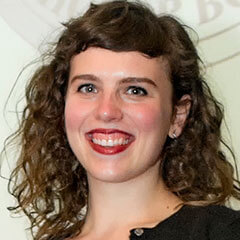 …People often ask me why I chose to write my book, Sonya’s Chickens, on the topic of
…People often ask me why I chose to write my book, Sonya’s Chickens, on the topic of
death. (Spoiler alert: A pet chicken gets killed.)
But when I created my book, educating kids about death wasn’t my intention. All I intended to do was capture a moment of trust between a parent and child. Sonya’s parents trust her to take care of three chicks, and when one disappears, they trust that she can handle the truth, the truth being, in a nutshell: it happens.
I count myself incredibly lucky to have parents who trusted me when I told them that there was just not enough time in school to draw. And of course who not only trusted me, but were in such a position as to take action on that front as well, something many parents aren’t able to do, no matter how much they may want to.
I want to create books in which children are trusted, and therefore empowered to trust themselves. Stories that create sanctuaries in which kids are allowed the space to be as independent, as goofy, as vulnerable, as emotionally complex as they deserve. And images as vibrant and rich as a child’s own inner life, characters and details that remain potent and familiar long after what book exactly they were from is forgotten.
I can only hope that being presented with this award is an indication that I have been right to trust myself, that I am indeed on the right track in making books.
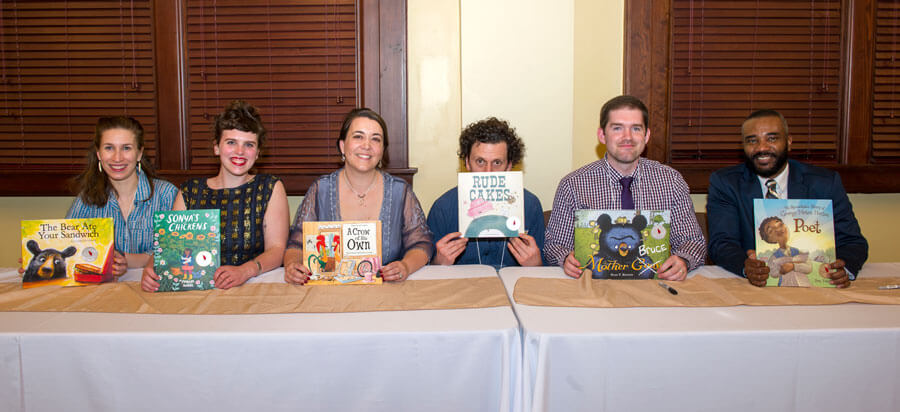
Megan Dowd Lambert, New Writer Honor
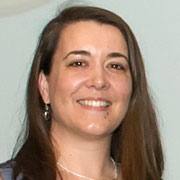 …Think of Peter crunch, crunch, crunching his way through a snowy day. Remember how he sees the big boys having a snowball fight and thinks it would be fun to join them? But, he knows he isn’t big enough, “not yet.” Those two words, “not yet” hold hope as they anticipate the future and render his path not just a physical journey on one snowy day in his life but a metaphor for growing up.
…Think of Peter crunch, crunch, crunching his way through a snowy day. Remember how he sees the big boys having a snowball fight and thinks it would be fun to join them? But, he knows he isn’t big enough, “not yet.” Those two words, “not yet” hold hope as they anticipate the future and render his path not just a physical journey on one snowy day in his life but a metaphor for growing up.
Sometimes we adults look at children growing up, and instead of seeing hope, we frame their maturation as somehow tragic—think of the melancholic phrases, “the loss of innocence,” “they grow up so fast.” But isn’t growing up a birthright and not a tragedy? Shouldn’t we adults celebrate this growing up, and help clear that path? Or, in the words of Walter Dean Myers, “Let us celebrate the children and bring them peace.”
…I’m proud that Crow is being recognized by an award that specifically highlights books “that portray the universal qualities of childhood, a strong and supportive family, and the multicultural nature of our world.” When I was growing up, Keats’s books provided me, a white girl in rural Vermont, with images of racially and ethnically diverse children and urban beauty.
Now, as a mother of six children of diverse racial and ethnic backgrounds, I’m appreciative of the ways Keats’s work provides what Rudine Sims Bishop called “mirrors” to my children of color, and I’m aware of how he helped clear a path for other writers and artists, crucially including people of color and Native people, to make their marks in children’s literature, too.
So, please, let’s walk a path together toward a truly inclusive children’s literature that will embolden, delight, inspire and free all children as they realize the birthright of growing up to be exactly who they are. The “not yet” days are over for us adults when it comes to this work. The time is now.
Click here to read Megan’s speech in full.
Julia Sarcone-Roach, New Writer Honor
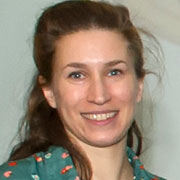 …The Bear Ate Your Sandwich began as a doodle of a big black bear standing in the middle of a sidewalk, looking out of place, in a bright, bustling city. Which is how I sometimes feel in New York.
…The Bear Ate Your Sandwich began as a doodle of a big black bear standing in the middle of a sidewalk, looking out of place, in a bright, bustling city. Which is how I sometimes feel in New York.
While working on the book, I did lots of research. I ate many sandwiches. And I walked around the city, pretending I was a bear. “Where would I climb?” “How does the ground feel beneath my paws?” And, “What’s that smell?” It was great fun.
I also became very sick while working on this book. There were times when it was hard to look ahead. This project is truly what kept me going. I could not have made it though without the love and support of my family and friends….
And not to give it away, but the book ends with a quote from Warren Zevon, “Enjoy every sandwich.” I’m so grateful to be here. Thank you for sharing this sandwich with me.
Rowboat Watkins, New Illustrator Honor
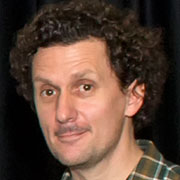 One of the main reasons I didn’t grow up to become an exotic dancer is because I have always been lousy at revealing myself in public. And while I readily admit to knowing nothing about pretty much everything, it at least seemed safe to assume that no one benefits from watching someone like me shimmy awkwardly behind a fan of feathers or a scant flash of silk. So, lacking any real plan, I decided to hide behind my desk. A desk seemed like a much better fit for someone with my particular lack of ooh-la-la.
One of the main reasons I didn’t grow up to become an exotic dancer is because I have always been lousy at revealing myself in public. And while I readily admit to knowing nothing about pretty much everything, it at least seemed safe to assume that no one benefits from watching someone like me shimmy awkwardly behind a fan of feathers or a scant flash of silk. So, lacking any real plan, I decided to hide behind my desk. A desk seemed like a much better fit for someone with my particular lack of ooh-la-la.
But what do I know? Well… if, like me, you were once foolish enough to believe that picture books would at least spare you the shame of having to suggestively shimmy in front of strangers, I’m sorry report that any decent picture book, regardless of its slant or trim size, is almost entirely about some kind of seduction: about the intimate dance between pictures and words; about knowing how little to show now; or how much to reveal after the page turn. Not to mention the fact that any story worth sharing involves at least peeking into the deepest recesses of your most private self. So, in the end, there is actually nowhere to hide.
Maybe the weirdest thing about life is how easy it is to make anything look pointlessly hard… .And by contrast, how hard it is to make anything feel genuinely easy. Which is what makes the Keatses and Sweets, and Seusses, and Steigs of the world so remarkable. That they all somehow manage to make picture book-making look and feel so effortless and fun. And yet still imbue their work with enough tooth or claw to continue to engage our attention, reading after reading, year after year. It is in their footsteps that I’m trying to find the rhythm of my own footwork, and hoping to learn the secret music that allows a book to feel forever fresh and necessary….
Ryan T. Higgins, New Illustrator Honor
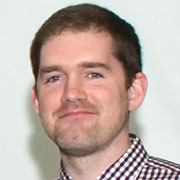 There were three important things I was supposed to remember about coming down to these ceremonies. One was that I needed to wear shoes. Another was that I should not wing my acceptance speech. And the last (and most important) was that I should keep this to around three minutes long—which is great because, if I talk slowly enough, it means I can keep this speech to just a bunch of thank you’s….
There were three important things I was supposed to remember about coming down to these ceremonies. One was that I needed to wear shoes. Another was that I should not wing my acceptance speech. And the last (and most important) was that I should keep this to around three minutes long—which is great because, if I talk slowly enough, it means I can keep this speech to just a bunch of thank you’s….
I should also thank the Portsmouth Naval Shipyard for losing my paperwork and not giving me a job interview a few years ago, when it looked like this whole author-illustrator gig wasn’t going to pan out. If I’d gotten a job there, I might not have given children’s books just one more shot.
Most importantly, I need to say thank you to my wife, Joanna. She’s back home in Maine with our two small kids right now, but I’m still going to point out just how important she is to me and my book-making career. Knowing full well that I had this crazy dream of becoming a children’s author and illustrator, she married me anyway. She worked tirelessly to make ends meet, while I shut myself in my studio writing and drawing things that had no guarantee of financial return. Without the sacrifices she’s made to provide for our family, allowing me to take a risk in pursuing my dreams, I wouldn’t be here. I’d be a plumber.
Deborah Pope, The Keats Centennial Lecture (closing words)
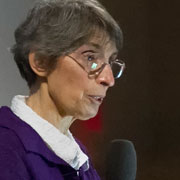 …Generations of children have recognized themselves in the books of Ezra Jack Keats, experiencing the joy of a day in the snow, the magic of imagination, the strength in friendship. He knew that experiences like these belong to children of all colors and wanted to make sure children understood that, too.
…Generations of children have recognized themselves in the books of Ezra Jack Keats, experiencing the joy of a day in the snow, the magic of imagination, the strength in friendship. He knew that experiences like these belong to children of all colors and wanted to make sure children understood that, too.
Today, we look for books that reflect our diverse population, and with increasing success we find them. Indeed that is why we are here today. We look for stories that take the reader to places they recognize or should learn about, and we find those as well. We know we need and will find children’s books that confront social and emotional problems. And we understand that some of these books may show children dealing with a problem but not always solving it. It was Ezra who opened the door.
This year Ezra would have been 100 years old. The world he wrote about is half a century away. And yet, in classrooms and bedrooms around the world, children continue to see their lives reflected in his books.
Thank you for coming on this journey with me to look more closely at all of the barriers Ezra broke and, as a result, at the ways his books have enriched the picture books of today.
